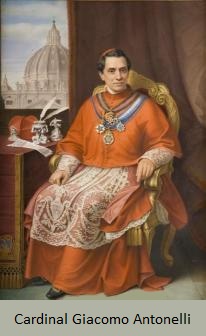 Just one side bound by concordats?
Just one side bound by concordats?
A century ago the Vatican denied that concordats were treaties with reciprocal obligations. It claimed that while the Pope's concordat partners were bound by concordats, he was not. It was said to be theologically impossible for the Church, the highest society of all, to be placed under an obligation by a lower one, such as a state. Has this conviction really changed, or is this no longer proclaimed due to improved marketing?
Originally concordats were agreements between the pope and a Catholic king, but today the Vatican presents concordats as treaties between two state governments. Calling concordats treaties enables them to override laws passed by elected legislatures. It also enables concordats to spread worldwide, since the Vatican can make "treaties" with countries that are predominantly non-Catholic or even non-Christian.
 However, this is a recent re-interpretation. A hundred years ago the Vatican was still claiming that it was a theological impossibility for concordats to be state treaties. At that time it also maintained quite openly that concordats bound only the other parties and not the pope and that this, too, was a theological necessity. So has Catholic theology been revolutionised in the last century, or is this just a change in concordat marketing strategy?
However, this is a recent re-interpretation. A hundred years ago the Vatican was still claiming that it was a theological impossibility for concordats to be state treaties. At that time it also maintained quite openly that concordats bound only the other parties and not the pope and that this, too, was a theological necessity. So has Catholic theology been revolutionised in the last century, or is this just a change in concordat marketing strategy?
The Catholic Encyclopedia has a revealing entry from 1908 on "Concordats". One of its authors was a Jesuit father and legal expert who was specially appointed to advise the Commission in Rome that codified canon law under the direction of Cardinal Pacelli, who would later become Pius XII. And, of course, the article was approved by the local Archbishop. In other words, this account of concordats should be authoritative.
Its authors firmly reject the theories that a concordat is either a law passed by the state in order to give the Church certain privileges or a bilateral treaty between the state and the Vatican. Neither of these can be true, they say, because this would put church-state relations on a basis of equality, which cannot be the case, for the Church has a loftier mission than the state.
The Church...is neither subordinate to, nor equal to, the State, but is in a true sense its superior. Hence, also, it follows that concordats are not bilateral contracts. [1]
They argue that, Instead of laws or treaties, concordats are "privileges" bestowed by the pope and these "privileges" place the state receiving them under corresponding "obligations".
Elsewhere the Catholic Encyclopedia defines a "privilege" as "a permanent concession made by a legislator outside of the common law. It is granted by special favour, and gives the privileged an advantage over the non-privileged individuals." In accordance with thisw, concordats are claimed to be "conventional privileges", the word "contractual" being carefully avoided. And consequently, they "[entail] certain duties or obligations correlative to the privilege". [2]
But what "privileges" do concordats actually bring? They extend Church influence in civil society and they generally oblige the state to pay hefty subsidies to the Church. ...Some privileges.
In a bilateral contract both parties are bound by their exchange of promises, but this, it is claimed, is not true of concordats.
♦ "It cannot be said that concordats impose on the pontiff an obligation which is the cause of a right in the other party, and of such a right as can be neither lawfully nor validly recalled." In other words, the state has no right to cancel a concordat if the Vatican fails to do as promised.
♦ "A concordat may be rightly defined as 'a particular ecclesiastical law for a certain country, enacted by the authority of the sovereign pontiff at the request of the ruler of that country, and strengthened by the special obligation, which that ruler takes upon himself, to observe its provisions forever.' " That is to say, though the concordat gives the state no rights, it does put it under an obligation and, furthermore, one that lasts forever.
♦ "In view of the fact that concordats have the force of ecclesiastical laws, they at once annul all laws and special customs that make for the contrary."

♦ "...It would be erroneous to maintain that both parties must concur in determining the meaning of a given clause or article. [...] Consequently, the Sovereign Pontiff always remains the authoritative interpreter."
♦ "...The highest community [the Church] enjoys the right of settling a discussion even though the inferior body [the state] withholds its consent."
♦ "...Should the pope rescind these privileges i.e., break the concordat], he would not ordinarily be bound to make any compensation to the State."
And all this is not just theory. When Portugal complained that Pius IX had violated the 1857 concordat, his Secretary of State, Cardinal Giacomo Antonelli, retorted that the Pope must retain jurisdiction over those questions which are settled in a concordat.
In other words, the Pope did not feel bound by his concordat.
Notes
1. "Concordats", Catholic Encyclopedia, 1908. http://www.newadvent.org/cathen/04196a.htm
Ecclesiastical approbation:
Nihil Obstat. Remy Lafort, Censor. Imprimatur. +John M. Farley, Archbishop of New York.
Authors:
Leo A. Kelly, Ph.B., Rochester, New York
Benedetto Ojetti, S.J., Consultor, S.C.P.F., Consultor, S.C.C, Consultor of the Commission on the Codification of Canon Law, Gregorian University, Rome.
2. "Privilege", Catholic Encyclopedia, 1911. http://www.newadvent.org/cathen/12436b.htm







